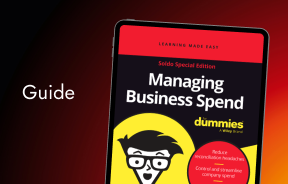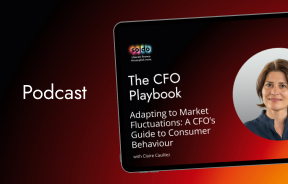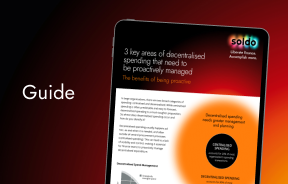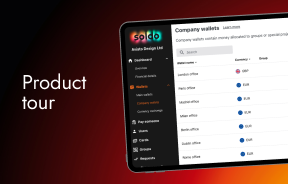Episode Summary
When Rahul Goel reflects on what he’s learned working in finance, he emphasizes the importance of connecting KPIs and finance goals to the organization’s larger mission.
Rahul, who is the Vice President of Finance for B2B e-commerce company Moglix, says operating with an “organization first” mentality will help you set KPIs that are in line with business goals.
On this episode of The CFO Playbook, Rahul discusses how he thinks about setting KPIs (as well as the limitations of purely financial KPIs), streamlining processes within finance operations, and why there is no one “best” solution when it comes to problem solving.
Rahul has noticed the changes in finance over the last 20 years: From a siloed, number-focused function to a more collaborative and transparent piece of the business.
One way that finance leaders can lean into transparency is by sharing successes as well as shortfalls. By starting a conversation about the things that didn’t quite create the desired outcome, you create an opportunity to discuss how improvements can be made during the next month, quarter or year.
For Rahul, leadership is not about being optimistic or pessimistic — he thinks it’s important for leaders to be realistic. No one can predict the future; all you can do is try and mitigate risk. For example, if you anticipate a bad quarter, set up a meeting with investors early and explain the factors playing into this rather than waiting until the quarter has ended to unload the bad news.
Guest Analysis
Name: Rahul Goel
What he does: Rahul, who has more than two decades of experience in finance, is the Vice President of Finance for Asia-based e-commerce company Moglix. Since starting with the company in August 2019, he’s helped the startup attract funding from investors like Tiger Global and Sequoia Capital.
Key quote: “Learning is the only constant in your life — you should continue to focus upon [learning and growth] — rather than focusing upon anything else.”
Where to find Rahul: LinkedIn
From Rahul Goel’s Playbook
Analyze which KPIs to focus on.
Different businesses require different KPIs. Businesses need to determine the metrics that matter most for them — beyond core financial metrics. Rahul emphasizes the importance of finance leaders understanding overarching business goals and developing KPIs to support those. It’s critically important for finance leaders to do that and go beyond simply publishing numbers.
Work on becoming fearless.
As a leader, being transparent is key. That means being fearless in sharing when a performance falls short. That also means celebrating the good days. A leader’s job includes admitting mistakes and balancing that ownership with highlighting the good being done. This means meeting with investors early if a quarter is likely going to underperform to explain the factors playing into it and how the next quarter can be improved.
Adapt or die — and don’t view technology as a threat.
Technology is constantly evolving, so you have to be willing and ready to adapt. Rahul says not being able to adapt to the pace of technology is the biggest mistake you can make as a finance leader. Technology can automate your processes, and it isn’t going away. Finding software that helps you is key. But don’t think technology can take away jobs. Instead, Rahul recommends using it to uplevel your work.
Episode Highlights
Don’t forget the human element
“We make sure that people are able to contribute towards society at large. That’s a clear message we tell our team because if you are able to save and provide, say, one oxygen concentrator, we may save hundreds of lives because it may be used for sharing purposes by other people as well … That’s how we were able to navigate these difficult times. So we try to engage and make sure that as a team, we have regular reviews, we talk about people, families as well, how their immediate families are doing too. It’s not only about work. It’s about how people get engaged for overall contribution to society at large, and talking about their personal needs, their emotional needs, as well as their financial needs…”
Technology can help relieve routine tasks
“We feel that cyclical routine things need to be automated, basically, with the help of technology. When you think from a technology perspective, if you have to get, say an aging report or whether it’s an ER report or an EPA report or payments, how [can you] make sure that you can use the help of technology to scale up your patients rather than worry about those things compared to someone doing it manually.”
Challenges will always be present, so try to think ahead
“I will say there’s no best solution for any given problem because the problems in a startup … keeps on changing. Like if you don’t do changes, development will implement any change, which will have an impact on your technology. So there are no best solutions … the way I think about technology. The way I think about it is there is a problem at hand and what is the next four, five years or three to five years of at least a solution [that] you’re looking for from a problem solving perspective. And whether that solution, what you’re trying to implement is scalable to make sure that you don’t have to re-implement the same solution with another software service provider one year down the line or two years down the line.”
Ask the right questions for business growth
“People are looking at scale-level businesses, which they were earlier looking [at] as well. The second thing is people are more focused on unit economics, which [asks], are you burning money? At what scale [are you] burning money? And what is the long-term value for customers for what you’re trying to create.”
Communication is key
“The business team needs to understand you are working with them to solve the business problem, rather than thinking you are trying to mitigate the business. When I look at the businesses or my team looks at the business, they look at how, on a long term-basis, we can help the business to grow in terms of which customers are a good thing, what are their needs, what are the margin improvement initiatives which we can drive with the help of business with the help of sourcing team or with the help of business team by either increasing the price of the customer or by reducing their costs, so we work very closely with businesses so we know to make sure that people feel that we are working as a cohesive team rather than working in silos.”
The importance of making data digestible
“The weight has changed over the years. I would say instead of a data provider, you have to become an information provider. That’s the way I think about finance function. So if you are only presenting data, leave it to the ability of the service provider or the recipient to absorb it. Different recipients will absorb it in different ways, so our job as a finance leader or as a finance professional becomes very important in how we can make the data into information, which is consumable by each person in a similar way.”
Top quotes:
“Fearless does not mean you go and fight with everybody. Fearless means what you feel based on your interpretation of financials, of the people, and what you are saying, being truthful to your job and putting correct numbers.”
“The idea is to not be very optimistic or very pessimistic. I am saying we should always try to be realistic.”
“I follow what I learned today, … which has helped me to make a better tomorrow, is the thing I always focus upon.”

















